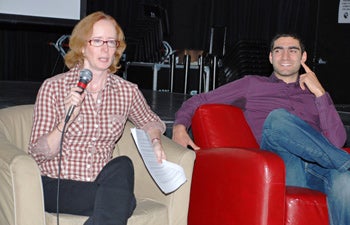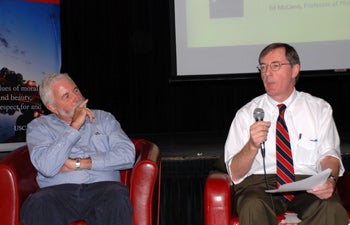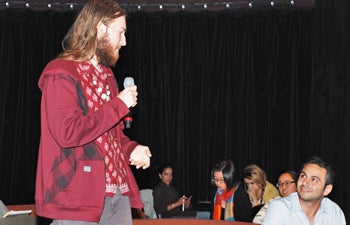Behind the Mask
When remembering Shakespeare’s words in Hamlet, “This above all: to thine own self be true,” most don’t consider that the play’s buffoon Polonius delivers the line.
“In the context of the play we’re meant to make fun of the line,” Rebecca Lemon, associate professor of English in USC Dornsife, told an audience Nov. 9 at Ground Zero Café.
Lemon was participating in a panel, “The Authentic Self,” part of the Coffeehouse Conversations on Practical Ethics series organized by the Levan Institute for Humanities and Ethics, housed in USC Dornsife. Other panelists were Ed McCann, professor of philosophy and English, and Ara Astoruian, second-year philosophy Ph.D. student, both of USC Dornsife; and Ronald Garet, the Carolyn Craig Franklin Professor of Law and Religion in the USC Gould School of Law.
The theme for Levan’s events this academic year is “Know Thyself.”
In Hamlet, Polonius advises his son Laertes, “To thine own self be true,” before first warning him, “Neither a borrower nor a lender be.”
The idea of “neither a borrower nor a lender be” in the early-modern world of credit relations would have been deeply unrealistic if one wanted to make it in any business, Lemon said.
“John Donne said, ‘No man is an island,’ but Polonius is telling his son to be an island; be a total island,” Lemon said. “But also, by the way, climb your way up in court and be connected in certain ways. Polonius is delivering contradictory, impossible advice.”
The same can be said about “To thine own self be true,” Lemon said.
“Polonius is suggesting, look within and ignore the outside world,” she said. “Come to your own truth, be your authentic self. So the history of thinking about the authentic self is to be separated from community and others.”

Rebecca Lemon, associate professor of English in USC Dornsife, says people are meant to interact. “We really are communicative, expressive beings,” she said. Next to Lemon, Ara Astoruian, second-year philosophy Ph.D. student of USC Dornsife, listens. Photo by Pamela J. Johnson.
Lemon doesn’t buy it.
“We have a sense that to be authentic means to be autonomous,”Lemon said. “We don’t like to think we’re influenced by ideology. We like to think we have authentic desires and drives. But I’ve really begun to question whether autonomy is the best way of thinking about being human. I actually think we are built to interact. And I’m not just talking biologically. We really are communicative, expressive beings.”
Panelists discussed whether ancestral history determines one’s real self, or whether it is possible to reject inheritance and still preserve one’s identity.
To make his point, McCann drew on the works of existentialists Søren Kierkegaard, Martin Heidegger, Jean-Paul Sartre and Simone de Beauvoir who shot down the notion that ancestral history, ethnic heritage or gender determines the sense of self. Rather, according to McCann, the existentialists said people should ask, “What am I going to make of that heritage, or of the fact I was born a male or female?”
“They rejected the notion of a substantial self or even a relatively fixed character,” McCann said. “The downside of this is the romanticization of the notion of autonomy. Exactly what Rebecca was calling into question.”
Panelists and audience members also wondered whether being authentic means following one’s true impulses. But what if at times one’s impulse is to act like a complete jerk? Or your impulse is to wear your emotions on your sleeve? McCann used sociologist and writer Erving Goffman’s work to point out that people rely on rituals in everyday life so that our behavior will be acceptable in social situations. Sometimes, unspoken social rules mean one must suppress his or her authentic self.
“Take a test yourself sometime,” McCann said. “If you find yourself in an elevator with a total stranger, don’t go in for our standard convention of standing side-by-side, looking up at the floor numbers as they tick away. Instead turn directly face-to-face with that person and try to engage that person in some sort of intimate conversion. You’ll soon find you transgressed a social boundary which is unspoken but which is very deep. Goffman’s books are replete with these kinds of examples.”

Ed McCann, professor of philosophy and English in USC Dornsife (left), said when seeking one’s authentic self, people sometimes romanticize the concept of autonomy. Here, he listens to Ronald Garet, the Carolyn Craig Franklin Professor of Law and Religion in the USC Gould School of Law. Photo by Pamela J. Johnson.
Astoruian discussed whether one’s “self” and “identity” depend upon ancestral history. If the terms “identity” and “self” refer to one’s soul or essence, then the self does not depend on ancestral history, he said. One’s essence is preserved regardless of family background.
“So, I instead opt to understand these words ‘self’ and ‘identity’ as referring to what we might colloquially call ‘character,’ ” he said. “And by that I mean, something like ‘who you are’ or ‘what makes you you.’ ”
When referring to one’s character, one’s ancestry may play a part.
“I look for myself in the sophistication of my great-grandfather or try to trace back my difficulties with trusting people to, say, the great terror my great-grandparents experienced during the Armenian Genocide,” he said.
But rather than studying one’s remote ancestors in seeking one’s authenticity, it may be best to search closer to home: the immediate family.
“If you notice that you are, say, generally skeptical about peoples’ intentions toward you, there is probably someone very close by who can empathize with you and help you understand why you are that way,” he said. “Or, if you find that you are unusually concerned about fairness, about people getting what they deserve, then ask around. Wouldn’t it be quite meaningful to discover that such an important part of you has a source in an unexpectedly dear place?”
Garet said the most definitive story of authenticity can be found in the Bible’s Old Testament in the story of Abraham, who leaves home and takes his own journey because God has called him. The story, Garet said, is about breaking from childhood and listening to one’s calling. In Genesis, God calls Abraham by name and Abraham answers, “Here I am.”

Audience members at Ground Zero Café join in on the conversation. Photo by Pamela J. Johnson.
“And that is my answer to the hard question of the authenticity of the self,” Garet said. “There’s a song by Simon and Garfunkel called, ‘The Only Living Boy in New York.’ The song says, ‘Half of the time we’re gone but we don’t know where. And we don’t know where.’ Between the twittering and the tweeting and the multitasking of our lives we’re gone and we don’t know where we are. While Simon sings that verse, in the background, in this beautiful, almost liturgical voice, Garfunkel sings, ‘Here I am. Here I am.’
“I think it is a possibility for each of us that someone will call to us,” Garet said. “Maybe it is God, maybe it is your lover, maybe it is the chief justice of the Supreme Court one day administering the oath of office to one of you as president of the United States. And at that moment I think you have the power to declare and bind yourself by singing with Garfunkel, ‘Here I am.’ ”
The institute’s Levan Coffeehouse Conversations typically take place at noon the last Wednesday of each month at the Ground Zero Café and include a free lunch. The next conversation takes place during the Spring semester.
“College is a time of self discovery and transition between childhood and adulthood, during which students seek to discover who they are and construct who they wish to become,” said Sharon Lloyd, professor of philosophy, law and political science in USC Dornsife, who is overseeing the coffeehouse conversations. “Having faculty from diverse fields — philosophy, psychology, literature, law and religion — assist students in this process of inquiry is what the Levan Institute of Humanities and Ethics is all about.”